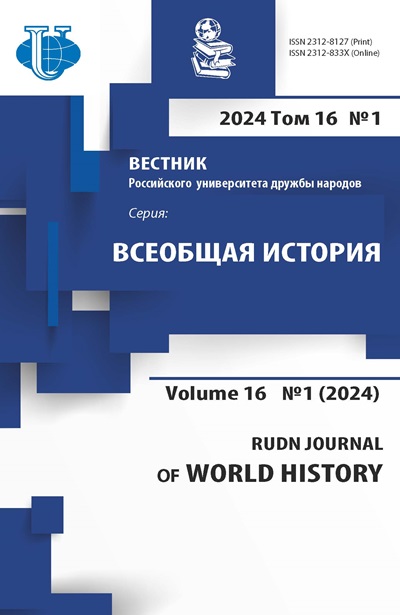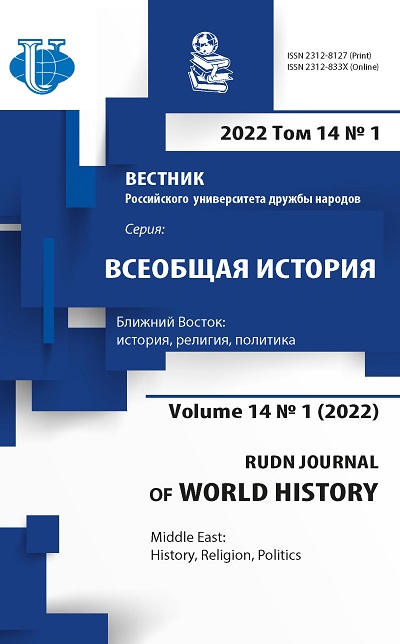Vol 14, No 1 (2022): Middle East: History, Religion, Politics
- Year: 2022
- Articles: 7
- URL: https://journals.rudn.ru/world-history/issue/view/1518
- DOI: https://doi.org/10.22363/2312-8127-2022-14-1
Full Issue
Religion and Politics in the Middle East
Caliphate in the Ideological Dialogue of the Islamic World: The Case of Pan-Islamic Congress in Cairo (1926)
Abstract
The article analyses the historical role and typological features of the movements for defense of the Caliphate that arose in various parts of the Muslim world as a result of the collapse of the Ottoman Empire and the abolition of the Caliphate. The liquidation of the Ottoman Caliphate in 1924 by the Republican leadership of Turkey put again on the agenda the question of the Muslim unity and transregional cooperation. The authors focus on the new round of socio-political discussions about the unity of the Ummah and the future fate of the Caliphate. The extensive dialogue of the defenders of the idea of Caliphate and supporters of its restoration from different Islamic countries led to the emergence of various ideological approaches to this issue which reflected regional specifics in the interpretation of the essence of this institution in the Middle East, North Africa, and South Asia. Using the vivid example of the Pan-Islamic Congress for the Caliphate in Cairo (1926), the article examines the reasons for disagreements in the political, religious and philosophical matters among the advocates of Caliphate from the main Islamic regions. The article focuses on the difficulties faced by the Islamic thinkers - supporters of the Caliphate in the drastically changed conditions of world geopolitics and the wide spread of ideas of secular statehood. The article investigates the historical and cultural origins of interest in the concepts of the Caliphate among Muslims in various parts of the Islamic world. The article also explores various types of reactions of Muslims in the Middle East, North Africa and South Asia to the repudiation of the Caliphate by the Republican Turkey.
 7-19
7-19


Shiite Pilgrimage to Atabat in the Context of Iranian-Iraqi Relations in Second Half of the 19th - Early 20th Centuries
Abstract
The article is focused on the study of various aspects of the Shiite pilgrimage to the holy land of Iraq - atabat, which was an important part of the Shia-Sunni and interstate relations of the two neighbouring countries. Having a long history and having been actively practised during the entire period of the Qajar rule in Iran, it was interrupted in the 1920ies for political reasons connected with the adoption of new principles of state building in both countries. The article, based on archival documentary materials and travelogues both in Russian and Persian, partly introduced into scientific circulation for the first time, creates a detailed picture of the pious wandering of the Shiа which is analyzed in its religious and political aspects.
 20-32
20-32


Impact of Islamic Ethics on cybersecurity policy in Iran
Abstract
This article tries to investigate whether there is an influence of Islamic Ethics on cybersecurity policy in Iran. It represents the government’s approaches towards formulating cybersecurity policy in the country. Islamic Ethics is vital because it is a backbone of a good society. Every Muslim should conduct in accordance with Islamic law and must remember that all actions have certain consequences and man is in charge of his behavior. Therefore, people will be able to live in peace and there won’t be need to be afraid of criminals. Many recent studies have focused on the problem of Islamic ethics and its influence on different aspects of life of Muslims. It seems interesting to explore the relationships between Islamic ethics and IT because IT gets deeper into people’s life becoming the aspect that it is difficult - if not impossible - to imagine life without it nowadays. With the advent of information and communication technologies it is needed to concentrate on ethical foundations that are able to regulate cyberspace.
 33-42
33-42


Political History of the East
Formation of the national political elites in Sudan in the Interbellum
Abstract
This work aims to study the formation of national elites in Sudan in the interbellum as this very period predetermined the country’s history since gaining independence in 1956. Within this article relations between three main groups are considered, namely religious, military and civil elites. The study is divided into three main parts. The first one concentrates on the history of Sudan before 1918, the second one is devoted to the interwar period, the third part aims to study the development of Sudan in World War II and the first post-war years. The special emphasis is given to the Sufi Tariqas as being not only religious but firstly political institutions. Directly within the context of Tariqas’ political and social influence, this article aims to study the formation of movements, political parties and associations, whose representatives later entered the political authority of the country. The Sudanese specifics of the national elites’ formation studied in this work is that the conservative religious elites managed to maintain the leading position within the struggle between traditional and modern political powers. The work explains how the inner nature of these elites, as well as their relations with the military and civil elites, predetermined the subsequent events.
 43-58
43-58


History of Islam
Socio-political role of Sufism in Egypt before and after the Ottoman conquest of 1517
Abstract
The article presents a comparative analysis of Sufism as one of the most important sides of the Muslim religion in the Mamluk and Ottoman periods of Egyptian history. The aim of the study is to trace the changes in various aspects of the mystical-ascetic movement and determine its role in the social, political, religious and cultural spheres of life of the Egyptians. Both epochs are significant for the formation of a systematized, ideologically shaped Sufism and for its popular, non-systemic stream, and its useful to note that the its greatest flowering occurs during the period of Ottoman rule.
 59-81
59-81


Oriental Studies
Investigating the relations between the Mongols and Christians and its role in the collapse of Islamic governments. From the beginning of the Mongol conquests until Abaqa Khan’s death
Abstract
The emergence of the Mongols and their invasion of Islamic lands is the most important phenomenon of the thirteenth century which dealt a severe blow to the Muslim governments present in the Islamic world and shook and sometimes uprooted their political-military as well as social and economic structures. At this time, the Christians of Europe and the Catholic Church, as well as the Christians living in the Eastern and Islamic lands, who saw the Muslims as their long-time enemy, tried to accompany the Mongols and interact with them from various religious, political, and military aspects to suppress and destroy the existing Islamic governments in the region, including the Abbasid Caliphate in Baghdad, the Ayyubids the Levant and the Mamluks in Egypt. The present research, with theoretical analysis and review of historical events of this time and evaluating the available data, emphasizes not only the effective role of Christians in the Mongols’ confrontation with Islamic governments. It also explains their relations with the Mongols, taking into account the ruling families of the Mongols.
 82-92
82-92


Reviews
Book Review: Menga F. Power and Water in Central Asia. London and New York: Routledge, 2018
 93-96
93-96
















